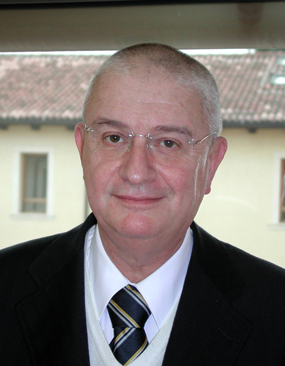Studying at the University of Verona
Here you can find information on the organisational aspects of the Programme, lecture timetables, learning activities and useful contact details for your time at the University, from enrolment to graduation.
Academic calendar
The academic calendar shows the deadlines and scheduled events that are relevant to students, teaching and technical-administrative staff of the University. Public holidays and University closures are also indicated. The academic year normally begins on 1 October each year and ends on 30 September of the following year.
Course calendar
The Academic Calendar sets out the degree programme lecture and exam timetables, as well as the relevant university closure dates..
| Period | From | To |
|---|---|---|
| 1° Periodo di lezioni | Oct 1, 2014 | Dec 16, 2014 |
| Periodo riservato ad eventuali recuperi di lezioni - dicembre 2014 | Dec 17, 2014 | Dec 18, 2014 |
| 2° Periodo di lezioni - febbraio/marzo 2015 | Feb 10, 2015 | Mar 30, 2015 |
| 2° Periodo di lezioni - aprile/maggio 2015 | Apr 8, 2015 | May 5, 2015 |
| Periodo riservato ad eventuali recuperi di lezioni - maggio 2015 | May 6, 2015 | May 8, 2015 |
| Session | From | To |
|---|---|---|
| Sessione straordinaria 14/15 - studenti f.c. - dicembre 2014 | Dec 19, 2014 | Dec 23, 2014 |
| 1° appello - Sessione invernale 14/15 | Jan 8, 2015 | Jan 14, 2015 |
| 2° appello - Sessione invernale 14/15 | Feb 2, 2015 | Feb 7, 2015 |
| Sessione straordinaria 14/15 - studenti f.c. - marzo/aprile 2015 | Mar 31, 2015 | Apr 2, 2015 |
| 1° appello - Sessione estiva 14/15 | May 11, 2015 | May 16, 2015 |
| 2° appello - Sessione estiva 14/15 | Jun 8, 2015 | Jun 13, 2015 |
| 3° appello - Sessione estiva 14/15 | Jul 6, 2015 | Jul 11, 2015 |
| 1° appello - Sessione autunnale 14/15 | Aug 31, 2015 | Sep 5, 2015 |
| 2° appello - Sessione autunnale 14/15 | Sep 24, 2015 | Sep 30, 2015 |
| Session | From | To |
|---|---|---|
| Termine presentazione tesi di laurea - ottobre 2014 | Sep 25, 2014 | Sep 25, 2014 |
| Sessione autunnale 14/15 | Oct 20, 2014 | Oct 21, 2014 |
| Termine presentazione tesi di laurea - gennaio 2015 | Jan 12, 2015 | Jan 12, 2015 |
| Sessione invernale 14/15 | Feb 9, 2015 | Feb 9, 2015 |
| Termine presentazione tesi di laurea - marzo 2015 | Feb 13, 2015 | Feb 13, 2015 |
| Sessione invernale 14/15 - marzo 2015 | Mar 17, 2015 | Mar 19, 2015 |
| Termine presentazione tesi di laurea - luglio 2015 | Jun 8, 2015 | Jun 8, 2015 |
| Sessione estiva 14/15 | Jul 2, 2015 | Jul 3, 2015 |
| Period | From | To |
|---|---|---|
| Festa di Ognissanti | Nov 1, 2014 | Nov 1, 2014 |
| Festa dell'Immacolata Concezione | Dec 8, 2014 | Dec 8, 2014 |
| Vacanze di Natale | Dec 24, 2014 | Jan 6, 2015 |
| Vacanze di Pasqua | Apr 3, 2015 | Apr 7, 2015 |
| Festa della Liberazione | Apr 25, 2015 | Apr 25, 2015 |
| Festa dei Lavoratori | May 1, 2015 | May 1, 2015 |
| Festa del S. Patrono S. Zeno | May 21, 2015 | May 21, 2015 |
| Festa della Repubblica | Jun 2, 2015 | Jun 2, 2015 |
Exam calendar
Exam dates and rounds are managed by the relevant Law Teaching and Student Services Unit.
To view all the exam sessions available, please use the Exam dashboard on ESSE3.
If you forgot your login details or have problems logging in, please contact the relevant IT HelpDesk, or check the login details recovery web page.
Academic staff
 giovanni.alberti@univr.it
giovanni.alberti@univr.it
 roberto.flor@univr.it
roberto.flor@univr.it
 rita.maggi@univr.it
rita.maggi@univr.it
 martina.menon@univr.it
martina.menon@univr.it

Patrono Paolo
 paolo.patrono@univr.it
paolo.patrono@univr.it
 +39 045 8028813
+39 045 8028813
Strano Silvana
 silvana.stranoligato@univr.it
silvana.stranoligato@univr.it
 +39 045 8028856
+39 045 8028856
 claudio.tomazzoli@univr.it
claudio.tomazzoli@univr.it
 marcella.veronesi@univr.it
marcella.veronesi@univr.it
Study Plan
The Study Plan includes all modules, teaching and learning activities that each student will need to undertake during their time at the University.
Please select your Study Plan based on your enrollment year.
1° Year
| Modules | Credits | TAF | SSD |
|---|
Legal terminology in a foreign language2° Year activated in the A.Y. 2015/2016
| Modules | Credits | TAF | SSD |
|---|
3° Year activated in the A.Y. 2016/2017
| Modules | Credits | TAF | SSD |
|---|
| Modules | Credits | TAF | SSD |
|---|
Legal terminology in a foreign language| Modules | Credits | TAF | SSD |
|---|
| Modules | Credits | TAF | SSD |
|---|
Legend | Type of training activity (TTA)
TAF (Type of Educational Activity) All courses and activities are classified into different types of educational activities, indicated by a letter.
EU Labour Law (2016/2017)
Teaching code
4S000874
Teacher
Coordinator
Credits
6
Also offered in courses:
- EU Labour Law of the course Combined Bachelor's + Master's degree in Law
Language
Italian
Scientific Disciplinary Sector (SSD)
IUS/07 - LABOUR LAW
Period
2° periodo di lezioni - aprile/maggio 2017, 2° periodo di lezioni - febbraio/aprile 2017
Learning outcomes
The course aims at providing the necessary conceptual, normative and methodological bases for analysing and understanding the system of labour law and industrial relations at the EU level. The purpose of the course is to make the student capable of assessing the issues arising in the implementation of the theoretical and regulatory framework, through correct reasoning and arguments.
Program
The course analyses the historical development of the EU social policy, from the founding Treaty to the entry into force of the Lisbon Treaty in December 2009. The first part of the course is devoted to the functioning of the EU law sources: starting from the legally binding nature of the Charter of fundamental rights, specific attention will be paid to the distinction between hard law and soft law sources and to the functioning of the EU social dialogue. The course will proceed to investigate the traditional topics of the EU social law: free movement of workers, employment policies, atypical jobs, discriminations, working time, companies’ crises, health and safety at work. The analysis will also focus on the directives adopted on the basis of Title V of the TEUF. The study of the main meaningful judgements of the Court of Justice of the EU will also be an integral part of the course.
The development of the Treaties and of Social Law. From the First Social Action Programme to Europe 2020: the policies of the Commission. The Social Title of the Treaty. Hard law and Soft Law: employment policies. Social dialogue. Free movement of workers. The Directives adopted in accordance to Title V of the Lisbon Treaty. The case-law of the Court of Justice: meaningful cases.
| Author | Title | Publishing house | Year | ISBN | Notes |
|---|---|---|---|---|---|
| Massimo ROCCELLA - Tiziano TREU | Diritto del lavoro della Comunità europea | Cedam - Padova | 2016 |
Examination Methods
For students not attending the exam is oral; for attending students, the oral examination is anticipated by a written test.
ERASMUS students are asked to to contact the professor Calafà (laura.calafa@univr.it) at the beginning of the course in order to agree with the teaching methods and assessment tests.
Teaching materials e documents
-
 PROGRAMMA E TESTI CONSIGLIATI
(octet-stream, it, 18 KB, 02/08/16)
PROGRAMMA E TESTI CONSIGLIATI
(octet-stream, it, 18 KB, 02/08/16)
Type D and Type F activities
Modules not yet included
Career prospects
Module/Programme news
News for students
There you will find information, resources and services useful during your time at the University (Student’s exam record, your study plan on ESSE3, Distance Learning courses, university email account, office forms, administrative procedures, etc.). You can log into MyUnivr with your GIA login details: only in this way will you be able to receive notification of all the notices from your teachers and your secretariat via email and soon also via the Univr app.
Internships
Internships are aimed at enabling students to gain direct knowledge of the world of work and to acquire specific professional skills.
Internships are carried out under the responsibility of an individual lecturer, and can be carried out in professional firms, public administration bodies and companies recognised by the University of Verona.
Any CFU credits gained by doing internships will be recognised and recorded by the University in accordance with the relevant University regulations in force (Regolamento d’Ateneo per il riconoscimento dei crediti maturati negli stage universitari).
For further information on internships, please go to: https://www.univr.it/it/i-nostri-servizi/stage-e-tirocini.































